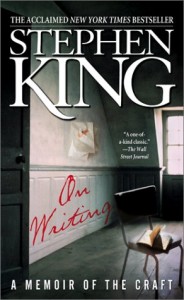Book Review: On Writing by Stephen King
 Stephen King’s On Writing is one of the best books I’ve read on how to become a writer. Not necessarily a professional scribe, but how any author can hone their craft until their work becomes readable and entertaining.
Stephen King’s On Writing is one of the best books I’ve read on how to become a writer. Not necessarily a professional scribe, but how any author can hone their craft until their work becomes readable and entertaining.
On Writing is full of King’s wit and charm as he explains how he builds his stories from the ground up. His encouraging voice is directed at fiction writers at the start of their careers, but his advice can be applied to anyone who wants to pursue their creative passion.
The book is divided into four parts: C.V., Toolbox, On Writing and then On Living.
C.V. is a short memoir that focuses on King’s life. As King says in the introduction: “This is not an autobiography. It is, rather, a kind of curriculum vitae – my attempt to show how one writer was formed,”
Some of the moments are tough to get through, particularly King’s upsetting history of drug and alcohol abuse. Fortunately, the entire section is spiked with his self-deprecating humour. Any fan of King’s work will enjoy reading this portion of the book.
Toolbox discusses the skills that every writer needs to be readable. Things like grammar, vocabulary, form and style. It’s the shortest part of the book, but still important and King, a former high school English teacher, makes it as entertaining as anyone could hope.
On Writing is the real meat of the book, where King explains how young writers should put their skills to good use. His ideas about drafting, story composition and research are all informative. In particular, I like how blue collar he is in his approach.
“[I]f you don’t want to work your ass off, you have no business trying to write well – settle back into competency and be grateful that you have even that much to fall back on,” King says in the introduction to the section.
According to King, his theories about writing and what it takes to succeed as an author are not popular with certain literary circles, but they appeal to me. Not just because it means there’s hope for the novice writer, but because I think that analyzing and honing one’s craft (whatever it may be) is the best way to succeed in any field. To see it applied to writing by one of the most widely read authors of the 20th century only confirms this.
The entire tone of the book is light-hearted and informal, with King making funny asides and offering insight and commentary about his canon, as well as the work of an array of authors including Cormac McCarthy, Ernest Hemingway, Tom Wolfe, Elmore Leonard and H.P. Lovecraft.
In On Living, the book’s postscript, King recounts the events surrounding the car accident that nearly took his life during the composition of On Writing. I say ‘surrounding’ because he can’t remember the actual event – his head smashing through the oncoming windshield of a van took care of that.
It’s the most moving part of the book, and possibly the most stomach-turning writing of King’s accomplished career. His description of what happened to his body, particularly his right leg which was broken into “so many marbles in a sock”, literally had me squirming on my couch.
On Writing will appeal to two groups of people: Stephen King’s fans will be attracted to the C.V. and On Living sections where they can learn about their favourite author. Aspiring novelists will prefer the Toolbox and On Writing sections for King’s insight into his craft.
For everyone else though, it can still be a quick, fun read that will make them think twice about Stephen King and the art of writing.